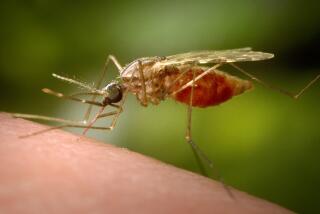Experimental AIDS Vaccine Prevents Virus in Monkeys
- Share via
WASHINGTON — An experimental vaccine containing genetic material from the AIDS virus has protected two chimpanzees against the deadly virus, suggesting the novel technique might someday be used to make an effective AIDS vaccine for people.
Two months after they were vaccinated, both of the chimpanzees fought off intravenous doses of the AIDS virus that would normally have been sufficient to infect 250 of the animals. The chimps remain healthy more than one year later, with tests indicating that they are completely free of the virus, said David B. Weiner, the University of Pennsylvania molecular immunologist who led the study.
The finding gives a boost to the relatively new technique--known as genetic or “naked DNA” vaccination--and to the company that made the vaccine, Apollon Inc. of Malvern, Pa. The company is already conducting safety tests of the vaccine in a small number of healthy, uninfected men. No results of the human tests are available yet.
“Chimps have very similar immune systems to people,” Weiner said.
Researchers warned that many other AIDS vaccines have looked similarly promising at the same early stage of development, only to fail in humans. Some scientists also criticized the study for its use of a strain of HIV known as SF2, which has a reputation for being relatively easy to fight off.
“It’s incremental progress,” said Alan Schultz, chief of preclinical AIDS vaccine development at the National Institute of Allergy and Infectious Diseases. “It’s . . . not the home run we’re all hoping for.”
Genetic vaccination is one of several approaches under investigation in what has remained a mostly disappointing effort to develop an AIDS vaccine.
The newly tested vaccine contains four HIV genes--snippets of DNA containing the genetic code that tells a cell how to make four HIV proteins.
When muscle cells around the injection site absorb the genes and start making the proteins, the immune system responds by producing swarms of antibodies and killer T cells that are primed to attack HIV should it ever appear.






